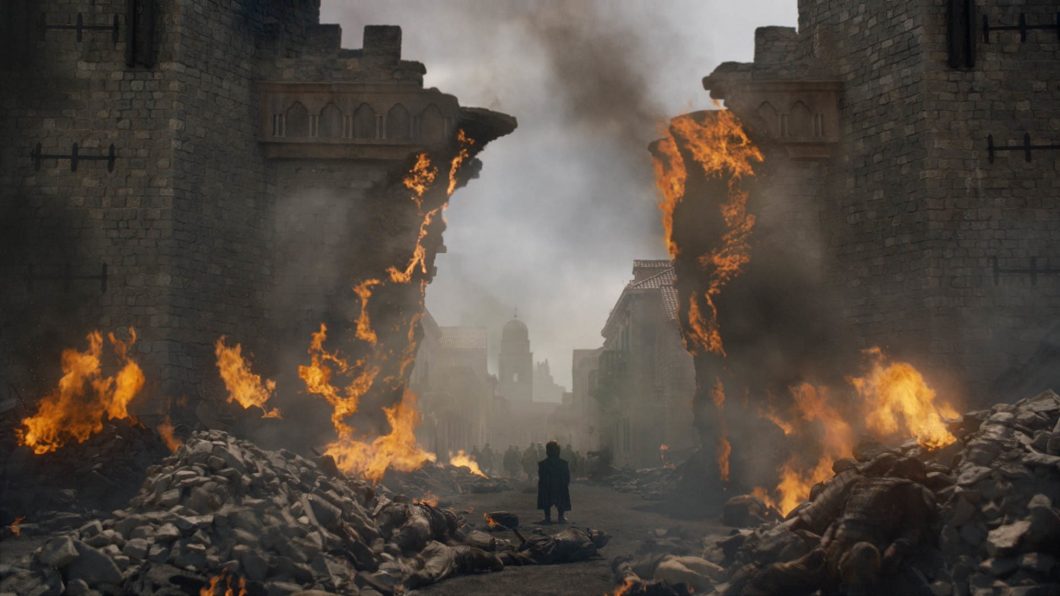The real goal of fitness should not be a beautiful body, but rather a well-lived life.
Game of Thrones Reminds Us That Virtue Is Not Enough
These days it takes a medieval fantasy to help us remember why liberal democracy is worth cherishing. The politics of Game of Thrones is premised on the negation of the salient characteristics of liberal democracy, such as limited government, separation of powers, and the consent of the governed. It may not be surprising that the absence of these institutions is terrible for the common folk, as demonstrated by the last week’s mass slaughter at King’s Landing, the capital of the fictional world of Westeros. But it is also difficult, if not impossible, for rulers and would-be rulers to flourish in a world of centralized power.
The prospect of absolute power drives contenders mad. Consider Daenerys, who for most of the series has been portrayed a potential liberator, and in the leadup to the series finale burns down the city over which she would reign. Power causes others to destroy what should be most dear to them, as when Stannis Baratheon—another contender for the throne—sacrifices his daughter in the vain hope of gaining favorable weather to win an essential battle.
Life is not appreciably better for those who secure the throne. It is now a commonplace that power corrupts but Game of Thrones also consistently reveals the frailties of those who cannot wisely wield authority. This turns out to be almost everyone. Neither the hereditary principle nor victory as a warrior predicts success as a sovereign. The eponymous “game” in fact starts when Robert Baratheon is deposed because he uses the throne to drink, hunt, and sleep around rather than watch over his kingdom. As one of the shrewdest characters—Tywin Lannister—notes, Robert’s nature condemned him to an inability to recognize the difference between winning and ruling.
Throughout the series, the plans of both the monarchs and the most powerful aspirants to the Iron Throne inevitably go awry. Some of these misfires flow from the failure of the hereditary principle. It is no accident that the most successful, if ultimately doomed, plotter in the entire series is Petyr Baelish, who rose from relative insignificance because of a real talent for intrigue. But these failures also stem from the chaotic nature of a world without strong institutions. In a society without the rule of law and where everything is up for grabs, it is hard to plan anything.
Moreover, the many voices inherent in a democracy provides information about the world that rulers of a centralized structure cannot easily replicate. One of the seldom-discussed themes of the series is the importance attributed to advisors. Tywin Lannister in fact defines wisdom in rulers as listening to advisors. Their centrality is symbolized by the office of Hand—the chief advisor to monarch and head of his council. The other would-be rulers have their equivalent, except for Baelish, who relies on himself.
But while it is surely true that choosing to heed advisors generally makes for a better ruler, it is nevertheless a lot less reliable a guard against bad government than being required to listen to the voices of the people. Rulers can and do ignore their advisors, with often disastrous effects—as when Stannis Baratheon sends away his chief advisor, Ser Davos Seaworth, so he can sacrifice his daughter. And the advisors can pursue their own interests rather than the interests of their leader—to say nothing of the interests of the kingdom. Indeed, the advice about listening to advisors comes from the most cynical character in Game of Thrones, who clearly offered this piece of advice to his young grandson so he can rule as the power behind the throne. Moreover, good advice can also be distorted by excessive affection for the leader: Tyrion Lannister was the smartest guy in the world until he fell in love with his leader Daenerys. Democracy is very imperfect but harnesses a much more diffuse form of wisdom.
The absence of an independent judiciary—another central feature of liberal democracy—also contributes to the political dysfunction of Westeros. Cases can be decided by combat, which are shown to have nothing to do with real justice. And tribunals themselves are made up of interested parties with no focus on the truth, as when Tywin Lannister condemns his own son to death for political expediency despite recognizing that the charges against him were false. Without any credible judiciary, disputes are routinely settled through vengeance and blood feuds, creating a cycle of violence.
Separating religion from the actual wielding of state power is another tenet of liberal democracy. When the leader of the established religion in King’s Landing enforces his will through coercive power he begins a train of events that leads to the deaths of thousands and the destruction of his own temple. The Priestess of the Lord of Light also tries to manipulate state power with similar results. She only redeems herself when she retreats to a more subtle and noncoercive role of encouraging courage and perseverance—an example that implies that religion is best when it works by persuasion.
Game of Thrones implicitly praises the institutions of liberal democracy by describing the horrors of their absence. It thus makes a substantial and I believe conscious contrast with the most famous fantasy of the preceding generations—The Lord of the Rings. That trilogy is completely unconcerned with institutions. The fight is simply between good and evil and the drama turns entirely on the fear that the good people might lose. Aragon, the king who returns at the end of the work, will in fact rule happily ever after with more absolute power than the stewards of the kingdom who ruled before him. He is a good man and at least as far as Tolkien presents it, that is the end of the difficulties of ruling. Amusingly, that seems to have been Elizabeth Warren’s first reaction to Game of Thrones, since walked back. She publicly praised the “liberator” Daenerys before she turned out to break bad at the end of the series. Further evidence—if we needed it—that Progressivism does not much care for checks and balances unless its exponents are out of power.
The finale of Game of Thrones underscores its institutional focus by introducing political reforms. The most important is that the lords of the realm will choose the monarch rather than have him selected by a hereditary principle, thus making it less likely that the monarch will be completely unfit to rule. Thus, the Seven Kingdoms becomes ruled by an elector rather than restoring hereditary monarchy. And they alter the arrangement by only including six kingdoms, because the North is sufficiently different that it will be allowed to rule itself, a recognition of the dangers of overcentralization. Jurisdictional competition comes to Westeros!
These are modest reforms. And the finale recognizes their modesty, when the assembled lords of the Seven Kingdoms laugh down Samwell Tarly’s proposal that the people themselves should have a say in choosing their rulers. But the history of most European nations—and the United Kingdom most of all—suggests that successful reforms are modest and incremental. Radical change creates a high risk of instability and death. Indeed, radical liberation is Daenerys’ watchword and her last speech in favor of her program before cheering soldiers conjures up the militarized totalitarianism of the twentieth century.
Liberal democracy ought to remain the ideal, but Burkean statesmanship is the way to make reforms. It may be the most important lesson of this medieval fantasy for our contemporary politics.



